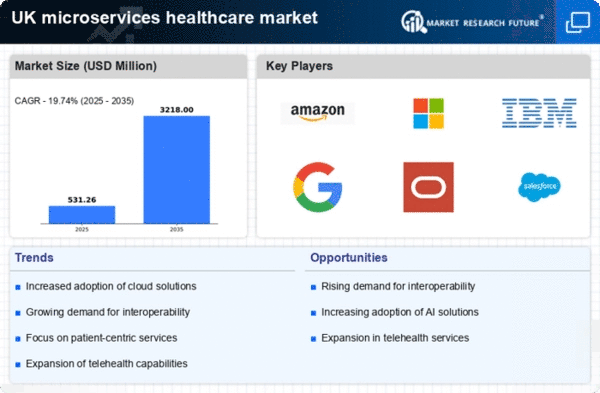Rising Focus on Cost Efficiency
Cost efficiency remains a critical driver in the microservices healthcare market. Healthcare providers in the UK are under constant pressure to reduce operational costs while maintaining high-quality care. Microservices architectures facilitate this by enabling organisations to optimise resource allocation and streamline processes. By breaking down monolithic applications into smaller, manageable services, healthcare providers can reduce redundancy and improve system performance. This approach not only lowers costs but also enhances agility in responding to changing healthcare demands. As organisations increasingly recognise the financial benefits, the microservices healthcare market is expected to witness a surge in adoption, with projections indicating a potential market value increase of £1.5 billion by 2027.
Integration of Advanced Technologies
The integration of advanced technologies such as artificial intelligence (AI), machine learning (ML), and the Internet of Things (IoT) is significantly influencing the microservices healthcare market. These technologies enhance the capabilities of microservices. These technologies enhance the capabilities of microservices, allowing for improved data analysis, patient monitoring, and predictive analytics. In the UK, healthcare providers are leveraging these innovations to create more efficient and effective care delivery models. For instance, AI-driven applications can analyse patient data in real-time, enabling timely interventions. This technological synergy is likely to drive the microservices healthcare market forward, with an estimated growth rate of 12% annually as organisations seek to harness the power of these advanced tools to improve patient outcomes.
Growing Demand for Personalised Healthcare
The microservices healthcare market is experiencing a notable shift towards personalised healthcare solutions. Patients increasingly seek tailored treatments that cater to their unique health profiles. This trend is driven by advancements in data analytics and artificial intelligence, which enable healthcare providers to offer customised care plans. In the UK, the National Health Service (NHS) has been actively promoting personalised medicine, which is expected to enhance patient outcomes and satisfaction. As a result, the microservices healthcare market is likely to expand, with an anticipated growth rate of approximately 15% annually over the next five years. This demand for personalised solutions is pushing healthcare organisations to adopt microservices architectures, allowing for greater flexibility and responsiveness to patient needs.
Increased Patient Engagement and Empowerment
Patient engagement is becoming a central focus in the microservices healthcare market. As patients become more informed and proactive about their health, healthcare providers are adapting their services to meet these expectations. The rise of digital health tools, such as mobile applications and telehealth services, empowers patients to take charge of their healthcare journeys. In the UK, initiatives aimed at enhancing patient involvement are gaining traction, leading to a more collaborative approach to care. This shift is prompting healthcare organisations to adopt microservices architectures that support seamless communication and data sharing between patients and providers. Consequently, the microservices healthcare market is likely to expand, driven by the need for solutions that foster patient engagement and satisfaction.
Regulatory Support for Digital Transformation
The UK government has been increasingly supportive of digital transformation initiatives within the healthcare sector. Policies aimed at enhancing digital health infrastructure are paving the way for the microservices healthcare market to flourish. The NHS Long Term Plan outlines a commitment to integrating digital technologies into healthcare delivery, which includes the adoption of microservices. This regulatory backing is crucial, as it encourages investment in innovative solutions that improve efficiency and patient care. With funding allocations reaching £2.1 billion for digital health initiatives, the microservices healthcare market is poised for significant growth. The alignment of regulatory frameworks with technological advancements suggests a conducive environment for the proliferation of microservices in healthcare.

















